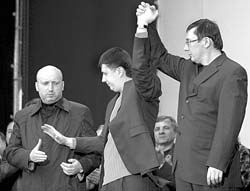Finish at the starting line

It looks as though the megabloc of all democratic forces is not going to work. Judging by everything, the Orange people will march into the elections in three separate columns. This is the best scenario because there may be more columns.
“An iron horseshoe, burning heart, and clenched fist must march into the elections as a single column.” This was the appeal issued by Our Ukraine a week ago Monday. That day Yurii Kostenko, the leader of the Ukrainian People’s Party (UNP) also urged the president to help form a single roster. Yet none of these attempts yielded any results.
Yulia Tymoshenko hammered the first nail into the megabloc’s coffin. She held a closed convention at the hotel complex Kyivska Rus’ on Wednesday to form her own election campaign bloc. In addition to Batkivshchyna, the BYuT was joined by the Reforms and Order Party, the Ukrainian Social Democratic Party, and Katerynchuk’s European Choice. The new BYuT is busy allocating places on the slate and drawing up the campaign schedule. Word spread through the closed doors of Batkivshchyna’s convention about the bloc’s top five contenders: Tymoshenko, Turchynov, Tomenko, Pynzenyk, and Vinsky.
There is also a strong likelihood that Our Ukraine will unite with the People’s Self-Defense. Yurii Lutsenko, however, is busy forming his own bloc, which will include the Forward, Ukraine Party, the Christian Democratic Party, and, of course, the People’s Self- Defense. It is expected that this bloc will be called Yurii Lutsenko’s People’s Self-Defense.”
Let’s not forget Ukrainska pravytsia [Ukrainian Right Wing] led by Tarasiuk and Kostenko. That makes four columns. Won’t this be too much?
Political scientist Vadym Karasiov believes that there is nothing terribly wrong with such political diversity: “The Ukrainian People’s Party, Our Ukraine, and the BYuT are parties that have the same political ideology but differing political accents and different segments of the electorate. Adding these accents and segments does not always produce a positive sum total effect. Politics is not arithmetic; it involves more sophisticated quantitative parameters and calculations, so it is sometimes better to march in several columns from the point of view of the future distribution of seats in parliament. Then these columns will meet in parliament and form a coalition majority, winning over adjacent electorates en route to parliament, which can be mobilized and taken away from political opponents.”
However, the main problem in Ukraine these days is not party rosters but the fact that none of the parties are prepared for an election campaign. Early elections have never taken place in Ukraine. The parliamentarians probably believed that they would survive the ordeal, so they weren’t particularly concerned with election legislation. As a result, the current legislation makes holding early elections practically impossible.
In addition, big problems have materialized in connection with the Central Election Commission. Eight out of thirteen CEC members have refused to make preparations for the early elections. So far, two members, Valerii Sheludko and Zhanna Usenko-Chorna, are maintaining their neutrality. Only three people support the idea of early elections and the need to quickly organize the work: CEC chairman Yaroslav Davydovych and members Andrii Mahera and Anatolii Pysarenko.
Naturally, holding elections under these circumstances will hurt all the parties. On April 14 Forward, Ukraine leader Viktor Musiiaka came up with a reasonable approach whereby the politicians should reach an agreement about the early election campaign, introduce amendments to the election legislation, and only then launch the election process. The most complex of these points is the first one — “the politicians must reach an agreement.” But so far, the opponents are not listening to each other.






